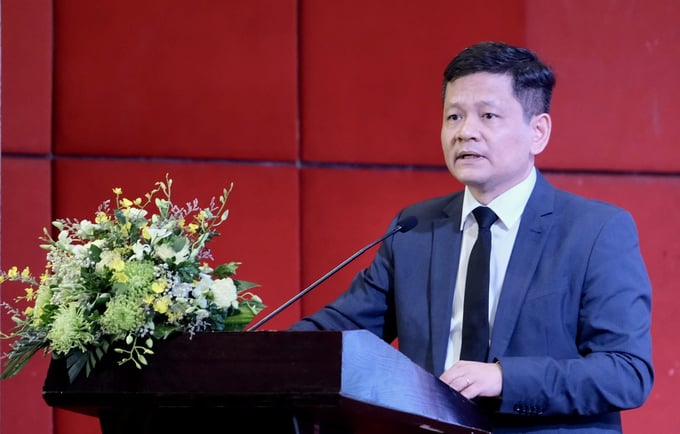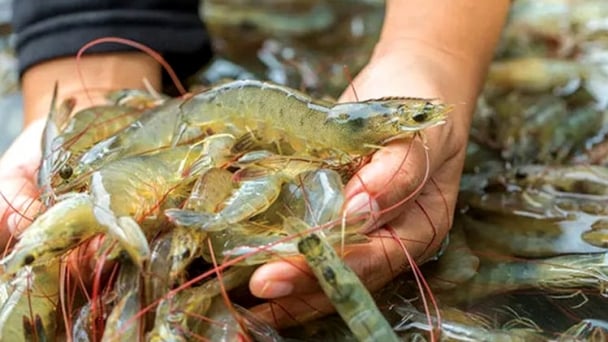May 23, 2025 | 12:32 GMT +7
May 23, 2025 | 12:32 GMT +7
Hotline: 0913.378.918
May 23, 2025 | 12:32 GMT +7
Hotline: 0913.378.918

Mr. Bui Ha Nam: Vietnam actively encourages partners and the private sector to participate in South-South cooperation.
Bui Ha Nam, the Middle East-Africa Department at the Ministry of Foreign Affairs, stated that Vietnam has actively mobilized development partners and the private sector to provide capital to implement projects in Africa, thereby promoting the resumption of the South-South cooperation channel on agriculture with Africa from 2021 to the present.
The Minister of Agriculture and Rural Development Le Minh Hoan, signed the Vietnam-FAO-Sierra Leone Tripartite Cooperation Agreement in November 2023. This agreement marked the beginning of a new era in South-South cooperation on agriculture between Vietnam and Africa, following a period of disruption caused by the COVID-19 pandemic.
Vietnam is currently collaborating with stakeholders to secure funding for additional initiatives in Uganda (in collaboration with the FAO and the EU), Nigeria (in partnership with the FAO), and other countries.
The host countries have recognized and highly appreciated the nearly 2,000 visits of Vietnamese agricultural experts to African countries to support agricultural development, conducted after nearly 30 years of implementing South-South cooperation initiatives on agriculture with Africa.
Vietnam has signed nearly 30 cooperation documents and agreements with African countries in agriculture and fisheries, establishing a long-term cooperation framework. Vietnam's rice varieties, agricultural practices, and experiences have been effectively implemented in Africa, thereby enhancing the quality of life and ensuring food security for the populace of beneficiary countries.
Vietnam has hosted numerous delegations of officials and experts from African countries to exchange and learn from their experiences, as well as to organize numerous conferences, policy seminars, experience sharing, organizational models, and agricultural development. In addition to sending experts to support African countries, Vietnam has also welcomed them.
Mr. Nam contends that food security has become a critical global concern, particularly in Africa, due to the rapid population growth, droughts, natural disasters, and intricate climate change developments in the wake of COVID-19.
Despite its substantial potential to become a global agricultural and food production center, Africa continues to confront numerous obstacles in infrastructure, resources, and agricultural development.
In Mozambique, projects that focus on developing food and cash commodities are particularly significant due to the scarcity of high-yield varieties of rice, soybeans, sweet potatoes, and vegetables in Africa.
In light of the accomplishments made in Africa, Vietnam's agricultural development model and policies are highly regarded for their cost-efficiency, efficacy, and compatibility with the farming practices and agricultural development level of this continent.
Numerous African nations, such as Ghana, Ivory Coast, Senegal, Benin, Madagascar, and Angola, are expressing interest in fostering agricultural cooperation programs and projects with Vietnam. They are seeking Vietnam's assistance in the areas of knowledge, experience, skills, best practices, technology, and resources in order to enhance crop yields and progress toward agricultural self-sufficiency and development.

Many Vietnamese experts have gone to Africa to support agricultural development.
According to Mr. Bui Ha Nam, African countries are united in their desire to enhance South-South cooperation due to their youthful populations and pressing requirements for sustainable food security.
The representative of the Middle East—Africa Department believes that South-South cooperation between Vietnam and African countries can be comprehensively implemented in the new context.
In terms of resources, the parties involved are actively engaged in pursuing and mobilizing development partners, international organizations, and the private sector to provide resources for the implementation of South-South cooperation initiatives through trilateral, quadrilateral, or public-private partnership models.
Furthermore, African countries can proactively suggest South-South agricultural cooperation initiatives by utilizing national budget funds and receiving technical assistance from Vietnamese experts.
In addition to transmitting traditional rice varieties and cultivation techniques, Vietnam may wish to consider expanding the scope of cooperation into other areas of strength, such as cashew nuts and coffee. Additionally, they may exchange agricultural solutions that facilitate climate change adaptation and agricultural practices that generate credits and mitigate carbon emissions.
Additionally, the growth of training channels for students, technicians, and agricultural specialists from African countries to study and exchange agricultural experiences in Vietnam will contribute to the development and growth of future human resources in Africa's agricultural sector.
The establishment of a cooperative network between universities, centers, and agricultural research institutes in Vietnam and African countries will establish a community that can be used to coordinate and implement academic exchange, research projects, new agricultural solutions, and cooperation opportunities.
Mr. Nam suggested that the Ministry of Agriculture and Rural Development collaborate with the Ministry of Foreign Affairs and pertinent agencies to expedite the completion of the agricultural cooperation plan with Africa in terms of mechanisms and cooperation frameworks. This would establish a legal framework and specify specific measures, resources, objectives, and implementation plans to improve the efficacy of agricultural cooperation with Africa.
Translated by Linh Linh

(VAN) WWF, GIZ, IUCN, UNDP call for biodiversity conservation and sustainable development must be regarded as a unity in strategies for a green future.

(VAN) On celebration of International Day for Biological Diversity, Deputy Minister Nguyen Quoc Tri called for practical actions to address nature and biodiversity conservation.

(VAN) Dr. Hoang Thi Thanh Nhan – Deputy Director of the Nature and Biodiversity Conservation Agency – highlighted this on the International Day for Biological Diversity, May 22, 2025.
![Ho Chi Minh city adapts to climate change: [2] Accelerating action](https://t.ex-cdn.com/nongnghiepmoitruong.vn/608w/files/chiqk/2025/05/22/4024-4220-bien-doi-khi-hau-1-100626_766.jpg)
(VAN) Clearly recognizing the challenges posed by climate change, Ho Chi Minh city has swiftly shaped its policies and implemented practical solutions to adapt.

(VAN) Rice straw is no longer just a discarded byproduct, but it is becoming a green resource that helps farmers in the Mekong Delta reduce emissions and promote circular, sustainable agriculture.

(VAN) Other Effective Area-based Conservation Measures (OECMs) are solutions that contribute effectively to achieving the goals of the Kunming–Montreal Global Biodiversity Framework.

(VAN) A study assessing the carbon footprint of whiteleg shrimp farming in China shows the potential for carbon emission reduction through the use of renewable energy.